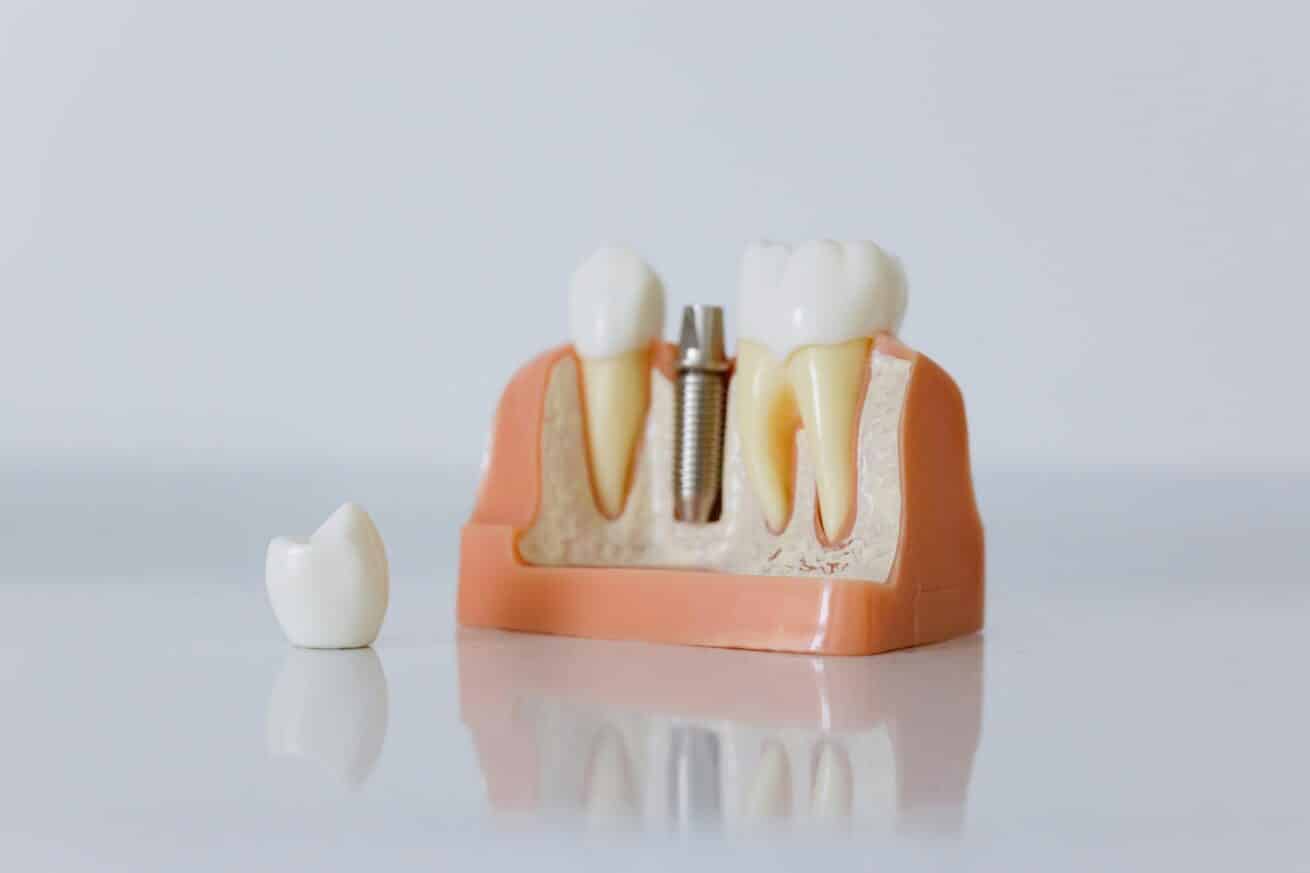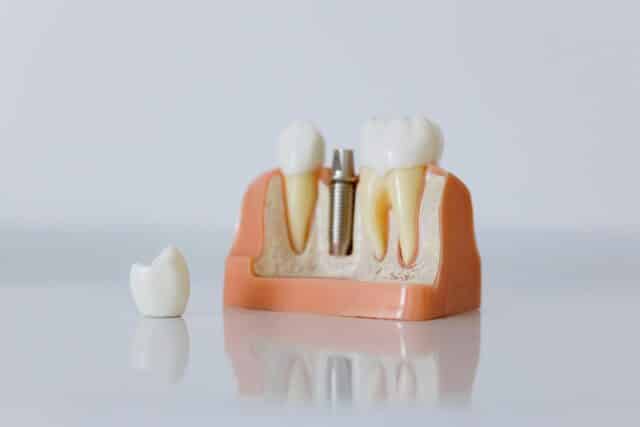Dental implants have revolutionized the way we approach tooth replacement, offering a robust solution for individuals with missing teeth. Traditionally, dental implants made from titanium and titanium alloys have been the industry standard for years.
However, ceramic dental implants are gaining attention for their unique advantages. Made from biocompatible materials like zirconia, ceramic implants provide an appealing alternative with both functional and aesthetic benefits.
In this blog, we’ll explore the benefits of ceramic dental implants and highlight why they are becoming a preferred choice for many patients seeking a natural-looking and effective solution for missing teeth.

What Are Ceramic Dental Implants?
Ceramic implants are dental implants made from zirconium dioxide, a type of ceramic material known for its excellent health compatibility and durability. Shaped like small screws, these implants are inserted into the jawbone where the tooth gap exists, serving as a stable base for crowns or bridges. Unlike traditional titanium implants, ceramic implants offer superior aesthetics and biocompatibility, adapting seamlessly to the gums and jawbone.
Ceramic implants are particularly valued for their natural appearance, as they closely resemble the color of natural teeth and roots. This makes them ideal for patients seeking a more discreet and aesthetically pleasing dental restoration.
Who Are Ceramic Implants Suitable For?
Ceramic implants are great for patients who seek a healthy, stable, and aesthetically pleasing solution after tooth extraction. As ceramic materials are hypoallergenic, they are an excellent option for those concerned about potential allergic reactions to metal. This makes them a perfect choice for patients sensitive to metals or those following a holistic approach to dental care.
Additionally, ceramic implants are ideal for patients who prioritize dental aesthetics. The natural tooth color of ceramic implants ensures they blend seamlessly with your existing teeth, providing a more natural look. This is especially beneficial for patients with thinner gum tissue, where traditional metal implants might be visible through the gums.
How Long Is the Procedure?
The procedure for placing a ceramic implant typically takes about 30 minutes to one hour, depending on the specific circumstances. The procedure is relatively quick if the length of time between tooth extraction and the implantation procedure is short to avoid shifting. However, if there is already a gap between the teeth, the jawbone needs to be prepared to ensure the implant fits precisely.
Before placing the ceramic implant, your dentist will prepare the jawbone, ensuring the implant’s correct axis, depth, and torque. The ceramic implant is then screwed into the jawbone. If necessary, bone augmentation can be performed simultaneously to enhance long-term stability.
After placement, ceramic implants require a healing period of approximately three months. During this time, it is crucial to avoid putting pressure on the implant to allow the bone to integrate fully.
For implants in the front, patients are provided with provisional restorations from composite materials to maintain their aesthetic qualities during the healing period. Once healed, the individual ceramic crowns are filled in with cement without a gap, completing the treatment.
What Are the Advantages of Ceramic Dental Implants?
Ceramic dental implants offer several advantages that make them an attractive option for many patients:
- Biocompatibility: Zirconium dioxide, famed for its excellent health compatibility, is a common material used to produce ceramic implants. Its low solubility and inertness make it ideal for dental implants because it reduces the risk of adverse reactions.
- Hypoallergenic: Ceramic implants are hypoallergenic, making them suitable for patients with metal allergies or sensitivities. This increases the likelihood of a successful implant lasting many years, or even a lifetime.
- Aesthetic Appeal: Ceramic implants closely resemble natural tooth enamel, providing a more natural and aesthetically pleasing appearance. This is particularly beneficial for patients with thinner gum tissue, as ceramic implants do not show through the gums like metal implants can.
- Oral Health: Ceramic implants attract fewer bacteria than titanium implants, reducing the risk of gum disease around the implant. The one-piece design of most ceramic implants eliminates gaps that could trap bacteria, promoting better oral health.
- Durability: Advances in ceramic materials have significantly improved the mechanical strength of ceramic implants, making them a durable and reliable alternative to metal implants.
What Are the Disadvantages of a Ceramic Tooth Implant?
While ceramic dental implants offer numerous benefits, there are also some disadvantages to consider:
- Higher Cost: Ceramic implants are generally more expensive than titanium implants due to the complex manufacturing process and additional steps required during placement.
- Lower Availability: Not all dental practices offer ceramic implants, making it more challenging to find a provider. Holistic dentists are more likely to provide this option.
- Risk of Fracture: Although ceramic implants are durable, they are more prone to fracture under extreme pressure than titanium implants, which can bend rather than break.
- Longer Healing Time: Ceramic implants required longer healing times in the past. However, modern ceramic materials and techniques have reduced this issue, making their healing time comparable to that of titanium implants.
- Technical Challenges: The handling and placement of ceramic implants differ from titanium implants, requiring dentists to adapt their techniques. The heat dissipation properties of ceramic also mean that great care must be taken to avoid overheating the bone during placement.

Experience the Natural Advantage of Ceramic Implants With Archpoint Implant Dentistry
A ceramic tooth implant offers a range of benefits that make it a compelling option for those seeking a natural, aesthetic, and biocompatible solution for tooth replacement. From their hypoallergenic properties and natural appearance to their excellent compatibility with gum and bone tissue, ceramic implants present a sophisticated choice for enhancing both dental health and aesthetics.
However, while ceramic implants come with impressive advantages, it is essential to weigh these against their potential drawbacks, such as higher costs and technical considerations. Understanding these factors can help you make an informed decision about whether ceramic implants are the right choice for you.
At Archpoint Implant Dentistry, we specialize in providing advanced dental solutions tailored to your unique needs. Our team is committed to offering comprehensive care, including ceramic dental implants, to help you achieve a healthy and beautiful smile. If you’re interested in exploring the natural advantages of ceramic implants, our experienced professionals are here to guide you through every step of the process.
Contact Archpoint today to schedule your consultation.








